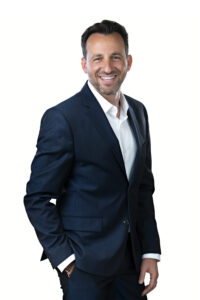Frank Fiorenza, Health Sciences Award

Inventor and Vice President, Sales and Marketing, McArthur Medical Sales
Respiratory Therapy, Class of 2002
With just $20 dollars in his pocket, Frank Fiorenza’s father arrived from Italy at Canada’s historic Pier 21 in Halifax in search of a better life. As a second-generation Canadian, Fiorenza reflects on how his father’s courage helped shape his success today. That familial spirit also sparked his desire to pursue what would become his passion.
“My grandfather had COPD (chronic obstructive pulmonary disease), a lung disease. He had smoked his entire life, pretty much from the time he was a child,” says Fiorenza. “At the time of his illness, I was in the process of deciding what I wanted to study and saw there was a respiratory therapist coming in to see him weekly. My grandfather loved their visits and it sounded like a pretty cool job. So, I started looking into it.”
Fiorenza quickly narrowed down Algonquin College as his school of choice. In 1998, he packed up his belongings and moved to Ottawa from Thunder Bay, Ont., in pursuit of a career in respiratory therapy.
Outside of his personal experience with his grandfather, Fiorenza knew little about the field or what the job entailed. As soon as he started the program, he realized the opportunities were endless. Fiorenza’s clinical year set in stone his post-graduation pursuits.
“I really fell in love with working in the ICU (intensive care unit),” says Fiorenza. “I had been thinking of moving back to Thunder Bay but halfway through my clinical year, I was offered a job at the University of Ottawa’s Heart Institute and began working there while cross-training in the ICU at the Ottawa Hospital’s Civic Campus.”
Throughout his studies and early career, mechanical ventilation had remained a point of interest for Fiorenza. He recalls a specific incident that ultimately shaped his career trajectory and propelled his passion for improving mechanical ventilation.
“I had a patient on a mechanical ventilator. There was a component that needed to be changed and I had to physically remove the patient from the ventilator, which basically terminates all therapy until I change the piece and reinstate the therapy,” he says. “I was thinking about how when I do that, all of these negative things happen to the patient, and I could be exposed to whatever’s in the ventilator circuit.”
Fiorenza took the problem into his own hands, brainstorming solutions to improve the mechanical ventilator experience for patient and practitioner. In September 2018, he landed on a design for a small mechanical ventilator attachment he named Flusso, which is Italian for “fluid flow.”
Flusso allows clinicians to optimize the management of a ventilated patient, such as changing a component on a machine or attaching a transport system if a patient needs to be moved, without causing interruption of therapy and risking the patient’s or their clinician health in the process.
About 40 Canadian hospitals were using Flusso in March 2022 when the pandemic hit and spiked demand from across North America. Today, hundreds of hospitals across Canada, the United States and Chile use Flusso, and Fiorenza has plans to expand into Europe and Colombia. Flusso has helped thousands of patients and protected millions of healthcare workers from potential airborne aerosol particles (such as COVID, TB, and pharmaceuticals).
“This is a global problem. Fixing this would not only fix the problem for people in Ottawa but any patient on a mechanical ventilator anywhere in the world,” says Fiorenza.
Flusso quickly won the 2018 Medical Design Excellence Award in New York City. A month later, it was a finalist in the 10th Innovation Prize in Paris, where more than 250 products were considered from 17 different countries.
Fiorenza’s new miniature Flusso, designed to be used with mechanical ventilators providing respiratory therapy to newborns, has received similar praise. It won the 2022 Medical Design Excellence Award in New York City.
Both Flusso devices are manufactured in Canada and have been supported by the Ontario Together Fund to support and increase in Canadian manufacturing and job growth alongside support from the Innovation Canada program.
Today, Fiorenza has more than five pieces of patented technology, three registered trademarks and over 18 patents/patents pending in Canada, the U.S. and Europe. He credits much of his success to the decisions he made early on in his career and taking the leap to enter a college program.
“Originally I thought that I would finish my degree at university in kinesiology and then go on to do physiotherapy or sports medicine and I really thought I couldn’t deviate from that,” he says. “But after I finished my degree, I knew I wanted an immersive learning experience. College was perfect for me. I was able to develop a real bond with my teachers and be surrounded by like-minded people with a similar entrepreneurial mindset.”
As a board member with the Canadian Society of Respiratory Therapists, recognized by the Respiratory Therapy Society of Ontario as advancing the profession of respiratory therapy and part of the Respiratory Therapy Advisory council for the Algonquin College Respiratory Therapy Program, but true to his entrepreneurial spirit, he now shares his knowledge as a mentor and leader within the medical community.
“I’ve consulted more than a dozen entrepreneurs who have reached out and said, ‘I have an idea, but I have no clue where to go from here. What do I do? How do I move forward?’ I figure out how I can help guide them in any way, whether that’s making introductions, taking on the product, or offering advice.”
Fiorenza says it’s not uncommon for him to get a couple of calls a week from new entrepreneurs looking for support, which he is always willing to provide. “I want to ensure that others can get their innovations to market to help patients and don’t have to go through the same challenges I did when I first started down the entrepreneurial path.”